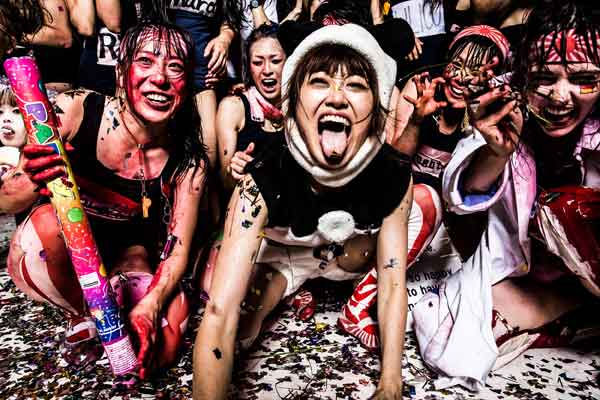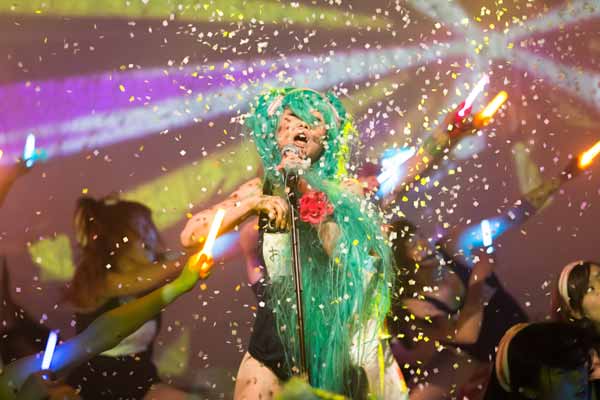Chaotic, frenetic, anarchistic – these are just some words that have been used to describe Miss Revolutionary Idol Beserker, the Japanese performance company founded by Toco Nikaido.
If you're energetic and seeking entertainment a little out of the ordinary, than Miss Revolutionary Idol Berserker's explosion of a show is your scene. Performances are interactive so that audience members become more than just observers, they end up as a part of the performance as well.
There's a message in the madness, an another world of disposable culture and outrages consumerism to explore. Fasten your seatbelts for Japan’s intense, part pop concert, part theatre work at OzAsia Festival. Toco Nikaido takes us on a journey of the high–octane hybrid performance.

Who/ what is Miss Revolutionary Idol Berserker?
Nikaido Toco is the Director and Choreographer of this theatre troupe that started in April, 2013. The other company members include Masami Kato, Amanda Waddell and Eri Takamura. The troupe creates their signature style by transforming the uniquely Japanese otaku (geek) culture into art.The show is performed with roughly 30 actors, who create a controlled chaos with militaristic precision from start to finish by continually singing and dancing to blaring anime and pop songs while at the same time referencing Japanese subculture. Based on the absolute discipline of the director, Toco Nikaido, and with excessive hospitality, this performance group invades the audience with persistent communication overflowing with generosity (omoteashi).
Our group kicked off in 2013 with a three-country tour to Zurich (Switzerland), Groningen (Netherlands) and Hamburg (Germany). In 2014, we performed in Hamburg and Berlin and were featured on the cover of the German dance magazine Tanz; not to mention, numerous newspapers, and interview articles, national and local German television. We are a group that has been picked up by different media outlets and have quite a high-profile abroad. In 2015, we performed in Munich (Germany) and Krems (Austria). In the same year from September to November we have our first Asian tour, where we’ve been invited to perform at OzAsia festival in Adelaide and at a theatre called Owl Spot in east Ikebukuro which is a ward of Tokyo.
What influences your performances?
Regardless of whether it’s old or new, east or west, anything is up for grabs. Whether the components comes from theatre, music, books, manga, movies, or from the personal interests, hobbies and dark pasts of my performers, everything is fair game. More specifically, the performance mostly draws from underground idol concerts, Japanese subculture, the world of revues and pub shows (burlesque shows), underground theatre aesthetics and the student movements of the '60s and '70s in Japan, and the praying and festivals surrounding inari (fox) shrines. Without using both the scientific and occult sides of society, I believe that it is impossible to depict modern times.What does the name mean?
I just took some of my favorite words and strung them together. Revolution, idol, going berserk, and chan! (Explanation: chan is an affectionate suffix that is added to the names of girls in Japan, which is why it is translated as 'miss')How would you describe a typical Miss Revolutionary Idol Berserker performance?
Within the cacophonous roar of Japanese subculture, anime and pop songs… Flying water! Flying confetti! A great variety of props! Microcosms alight with glow sticks! Through the overwhelming momentum of men and women, young and old, in school uniforms (and school issued swimsuits), there is the surprise of bodies breaking through their limits! This continuous momentary pleasure and the excited flow of energy that you can’t keep up with! Overwhelming heat/ passion and a show that is so over-the-top you can never get bored for even a single instance … that is the style of performance called 'Ohagi Live' that Miss Revolutionary Idol Berserker has coined.Consisting of three parts (roughly a 50-minute performance) that include a pre-set, which is preparation in performance, the main performance, followed by the compulsory encore. Our everyday lives in present-day Japan that are taken for granted by people just like us living in Tokyo. Our past experiences which are shaped from having all the necessities of life within our reach. How the sensibilities and personalities of the individual performers come from these things... Everything is taken into account in order to turn these 'events' and our stories into the 'story (of being alive)' in this day and age.

In this overloaded, disposable representation of the information society that flies by at breakneck speeds, large numbers of people fill the stage for 50-minutes straight. Furthermore, for the audience that has been placed in this situation where it is impossible to fully grasp all of the events at once, the distance between the viewer and the ones being viewed is completely taken over as well. The dissolution of this distance between the audience and performers gradually occurs as the audience’s heart is released. And finally at the end of the show the performers are in the audience and the audience is standing onstage, which is a reversal of their original positions. Through this reversal, the audience, which was once observing this process of turning otaku culture into art (which is the epitome of being exposed to modern Japanese society), can now experience becoming the originator of their own culture.
Based on the belief that 'people are not impressed by things that do not surprise them!' Toco Nikiado’s expression is not merely madness and chaos of the songs and dance at breakneck speeds, but rather a natural expression of people living in Japan/ Tokyo in 2015. It is not simply random chaos, but rather a story (the story of people alive today). The (sub)culture of idols, anime and otaku that is so uniquely Japanese in all of its different forms collides with this generation. And the bodies of young people from this generation forms the basis of a chaotic and strictly controlled performance, which in turn gives rise to a strong sense of unity and wholeness onstage.
What do you hope audience members get out of your performances?
The contact with the audience originates from the belief that 'people are not impressed by things that do not surprise them!' In addition, hospitality towards the audience in which 'you are the main character of the show' and 'we perform to please you' represents this spirit of hospitality. But also I ask that the viewers don’t just resign themselves to being trapped in their seats, but are willing to meet the show head on with their whole body and soul.At the end of the show when we bring the audience onstage, although you may have been splashed with water or despite whatever happened to you during the show, you can enjoy the release from being an 'audience' member. On top of that, you can also feel a sense of openness and euphoria from the release of all the complexes and emotions of the characters onstage that you were exposed to during the performance.
Culture in and of itself is not what is being presented onstage, but originates from the 'audience' that is enjoying the show. And in any event, this show is just an image that is created in the space that we’ve been presented with. What really matters to me is the 'feelings' that each and every audience member has after they leave the show. Whether they feel happy, or they’re at a loss for words, or they’re crying for some reason; whatever the audience feels after the show is really important to me.
How have you been perceived in Japan?
“Whoa…”Our form of expression, although it is very radical show and contains an excessive density of information, is not simply just noise and the hustle and bustle of chaos. Our aim is that within the roar a story should arise; our performance is a performance of intense pathos that has been deliberately been planned, calculated and choreographed.
What makes the Asian pop scene different from the rest of the world?
I cannot speak for all of Asia, but at least in regards to Japan – since we are an island nation that has a sort of amateurish, niche culture – I believe that this fan-based aspect of Japanese culture impacts the pop scene more than other countries. Within this unique and deeply-rooted culture, these sort of maniacal obsessions (fan psychoses), when compared with other countries has achieved a distinct development in which it is no longer questioned as belonging to either subculture or main culture. Miss Revolutionary Idol Berserker claims to represent modern Japan in its own right and a wide range of disposable Tokyo iconography that continues to be consumed and that symbolises this subject.Who are some artists from Japan that we should look out for?
This person isn’t Japanese, but there is one Australian who is currently making big news in Japan right now. He’s an Australian-born musician, who also performs in drag and female pro wrestling, called Ladybeard. He’s kind of a middle-aged looking guy who is overflowing in macho-man hormones. But he also is a professional wrestler who sings and dances in bikinis and nurse costumes (just to name a few). Bearded drag queen X JPOP X hardcore metal = hardcore kawaii (cuteness)!! He’s someone who came to Japan, branded himself for Japanese audiences in such a crazy and shocking way (laughs).What fashion inspires your performances?
Extremely colourful costumes and way over-the-top exaggerated clothing, and fancy costumes that are like Cosplay that may seem tricky to place, but also stereotypical of Japan. In regards to Miss Berserker’s custom-made costumes, they are modelled after school uniforms. By having adult men and women, who have already graduated from school, but who refuse to take off their uniforms. This spirit represents our group and the sort of uncontrollable side of human curiosity and obsession with youth, while at the same time having a distinctively toxic rainbow colour.What are the latest fashion trends in Japan?
Right now there’s been a sort of revival in 1970s fashion trends. Idols and singers are the fashion leaders in Japan and there are a lot of fashion trends that just mimics their style. Mainstream fashion for younger people are Harajuku-style, Lolita fashion and kawaii (cute) fashion, but also a sort of dark, storybook world and also relaxed Cosplay are trending. I have a number of different preferences, but I like comfortable clothing that’s easy to move around in and have a sort of personality and outlandish side to the design.What would you like Australian audiences to know about Miss Revolutionary Idol Berserker?
Water will splash you, a bunch of different things will fall on you, and you will be relentlessly communicated with through the show, for first timers it can be quite a shock… but don’t worry! We came all the way from Japan to meet you and we are a serious, but well-meaning group. You will enjoy the show with all of your five senses! Please come with the highest expectations! (Please come in clothing you don’t mind getting wet and dirty in!) Let’s be friends!! Please create a local fan club for us!! And we promise to go above and beyond anything you’ve ever seen before.Miss Revolutionary Idol Berserker performs the Adelaide Festival Centre as part of OzAsia Festival 30 September – 3 October.

